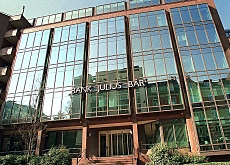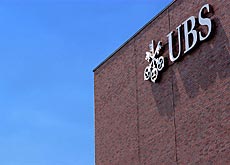Julius Bär strives for scale

Bank Julius Bär's expansion in a deal with UBS is a logical step in the consolidation of the private banking industry, London analyst Andy Penman tells swissinfo.
Penman, who is a senior global equity analyst with Barclays Stockbrokers, says the bank’s acquisition of UBS’ wealth unit would help it reach the size it needs in today’s competitive environment.
Under the terms of the deal, valued at SFr5.6 billion ($4.6 billion), Julius Bär will give SFr3.8 billion in cash to UBS for the unit, which is made up of three private banks and a fund manager called GAM.
Switzerland’s largest bank will also take a 21.5 per cent stake in Julius Bär, which is funding its purchase with a SFr2.45 billion rights issue.
swissinfo: How significant is this move for the world of Swiss banking?
Andy Penman: Clearly what this shows is that the Swiss banks are getting stronger in their domestic market and defending themselves to a certain degree. The news just confirms the trend of wealth management consolidation that has been going on for a while and which is likely to continue. Swiss investors should view it positively.
swissinfo: What does this move mean strategically for Julius Bär?
A.P.: The issue within private banking at Julius Bär has always been that of scale and in the past the bank has struggled just a little bit because of a lack of this, particularly since the financial market slowdown post 2000. If we look at recent first-half figures, Credit Suisse and UBS have showed some good growth in private banking, but Julius Bär was a little bit light relative to its main competition.
A lot of this can be put down to the fact that you need a certain size in order to cope with the increased regulatory burden in terms of costs. This may be compliant costs or anti-money laundering, for example. You need the product breadth, and distribution is now becoming increasingly important.
Scale helps delivers those, particularly in terms of the distribution arm, and I think that is what Bank Julius Bär is looking at specifically in making this deal.
swissinfo: What do you see in this deal for UBS?
A.P.: These four [wealth unit] businesses accounted for about four per cent of pre-tax profit last year, so it’s not massive in that respect. It’s certainly not as big a deal [for UBS] as it is for Bank Julius Bär.
What is interesting is that the value of these businesses hasn’t properly been reflected in the overall UBS rating within private banking, so possibly UBS sees better use for this cash. It could help in the longer term to provide a little more capital for joint venture investments, possibly within the Asia region. UBS has made it clear this is a strategic divestiture, but it is not looking to acquire Bank Julius Bär or to take a more meaningful stake just yet. It’s a logical sale of non-core assets with a potentially strategic investment in its place.
swissinfo: A UBS man, Hans de Gier, is to become the new CEO and another, David Solo, is to become head of asset management. What kind of a message does that send out?
A.P.: Hans de Gier is a veteran and has held several senior positions within UBS. Effectively he has been running this group of three private banks and GAM since a separate holding company for these assets was set up in early 2003. With him going in, it’s a logical step of business continuation in terms of the assets that Bank Julius Bär has acquired.
In terms of the other management, I think it is good for Julius Bär in that it will allow it to have a bit more of a refocus. It’s an enlarged group. It’s been underperforming relative to its peers so some new senior management coming in, seeing where it’s performing poorly operationally relative to its peers, can be a good thing in the long term.
[But] it might be difficult to digest in the short term for some of the current staff and close attention will be placed on asset flows in the next few months.
swissinfo: To help finance this deal, Julius Bär is going to carry out a SFr2.45 billion share sale. How easy will this be?
A.P.: It clearly depends on the market’s appetite. At present, the private banking environment remains pretty attractive. This [deal] now gives Bank Julius Bär the role of being a larger, pure-play private banking asset. It will now have scale. The new management will be viewed positively and there will be synergies to come, so with a fairly sanguine background for the capital markets at the moment, I think we’ll able to get this placing done at a reasonably decent price. I’m fairly confident that Bank Julius Bär will be able to come up with the required finance.
I would attribute a lot of today’s share price weakness down to hedge fund disappointment that the perceived small player, or hunted if you like, has decided to become bigger and, in effect, the hunter for the near-term.
swissinfo-interview: Robert Brookes
UBS is selling its private banking division to Bank Julius Bär for SFr5.6 billion.
Julius Bär will hand over SFr3.8 billion in cash, funds raised via a share issue.
The group will manage assets worth SFr270 billion.
UBS expects a pre-tax profit of SFr3.5 billion from the sale.
Julius Bär expects to cut ten per cent of its total workforce once the purchase is completed.
With this acquisition Julius Bär will become Switzerland’s largest wealth manager focused purely on private banking and asset management.
The acquisition includes the banks Ehinger & Armand von Ernst, Ferrier Lullin and Banco di Lugano, as well as the GAM fund manager.

In compliance with the JTI standards
More: SWI swissinfo.ch certified by the Journalism Trust Initiative











You can find an overview of ongoing debates with our journalists here . Please join us!
If you want to start a conversation about a topic raised in this article or want to report factual errors, email us at english@swissinfo.ch.